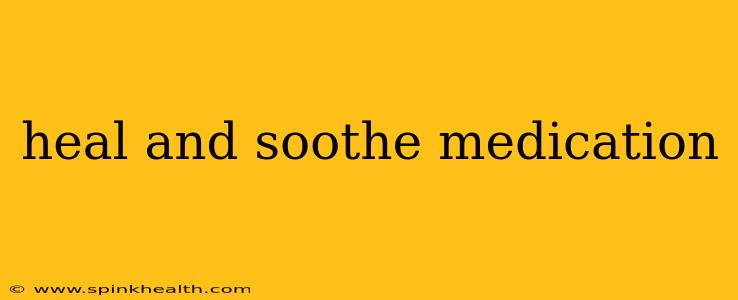Life throws curveballs. Sometimes, those curveballs leave us feeling battered and bruised, both physically and emotionally. Whether it's the lingering ache of a pulled muscle, the relentless burn of heartburn, or the unsettling anxiety that keeps us up at night, the need for healing and soothing is a universal human experience. This journey towards relief often involves medication, and understanding the options available can be crucial. Let's explore the world of medications designed to heal and soothe, focusing on different types and their applications. This is not a substitute for professional medical advice; always consult your doctor or pharmacist before starting any new medication.
What are some common types of medication used for healing and soothing?
This question touches upon a broad spectrum of medications. The type of medication best suited for you depends heavily on the specific ailment. Let's look at a few categories:
-
Pain Relievers: These are arguably the most common type of medication for healing and soothing. Over-the-counter options like acetaminophen (Tylenol) and ibuprofen (Advil, Motrin) target mild to moderate pain and inflammation. For stronger pain, prescription medications like opioids may be necessary, but these come with significant risks and should only be used under strict medical supervision.
-
Anti-inflammatory Medications: These medications target the underlying cause of inflammation, reducing swelling, pain, and stiffness. Nonsteroidal anti-inflammatory drugs (NSAIDs) like ibuprofen and naproxen are common examples, while corticosteroids (like prednisone) are stronger and usually prescribed for more serious conditions.
-
Antacids and H2 Blockers: For those battling heartburn and acid reflux, antacids provide quick relief by neutralizing stomach acid. H2 blockers, like cimetidine (Tagamet) and ranitidine (Zantac), reduce the production of stomach acid. Proton pump inhibitors (PPIs), such as omeprazole (Prilosec) and lansoprazole (Prevacid), are more potent and often prescribed for long-term management.
-
Antihistamines: These medications combat allergic reactions, relieving symptoms like itching, sneezing, and watery eyes. They're often used to treat allergies, but some also have sedative effects and are used as sleep aids.
-
Anxiolytics and Antidepressants: For emotional healing and soothing, anxiolytics (anti-anxiety medications) can help manage symptoms of anxiety disorders. Antidepressants are used to treat depression and other mood disorders, often leading to a sense of improved well-being and emotional healing.
What are the potential side effects of medications used for healing and soothing?
This is a crucial point. While medications offer relief, they also carry the potential for side effects. These can vary greatly depending on the medication and the individual. Some common side effects include:
- Nausea and vomiting: This is relatively common with many pain relievers and other medications.
- Drowsiness: Many pain relievers and antihistamines can cause drowsiness.
- Stomach upset: NSAIDs and other medications can irritate the stomach lining.
- Allergic reactions: These can range from mild skin rashes to severe anaphylaxis.
It's imperative to read the medication label carefully and discuss any concerns with your doctor or pharmacist.
What are some natural ways to heal and soothe?
While medications play a significant role, it's important to remember that natural methods can also contribute to healing and soothing. These include:
- Rest and relaxation: Adequate sleep and stress reduction techniques like yoga or meditation can significantly aid in recovery.
- Proper nutrition: A balanced diet supports the body's healing processes.
- Hydration: Drinking plenty of water helps flush out toxins and aids in recovery.
- Heat and cold therapy: Applying heat or cold packs can reduce inflammation and pain.
How long does it take for healing and soothing medication to work?
The time it takes for medication to work varies greatly depending on the medication and the condition being treated. Some medications provide quick relief, while others may take days or even weeks to show full effects. Always follow your doctor's instructions and be patient.
Are there any interactions between medications used for healing and soothing?
Yes, absolutely. Many medications can interact with each other, leading to unexpected side effects or reduced effectiveness. It's crucial to inform your doctor or pharmacist about all medications, supplements, and herbal remedies you are taking to avoid potentially dangerous interactions. This includes over-the-counter medications.
Remember, this information is for general knowledge and shouldn't replace professional medical advice. Always consult with a healthcare provider before starting any new medication or treatment plan. Your health and well-being are paramount, and taking a proactive approach to understanding your options is a significant step towards healing and soothing.

